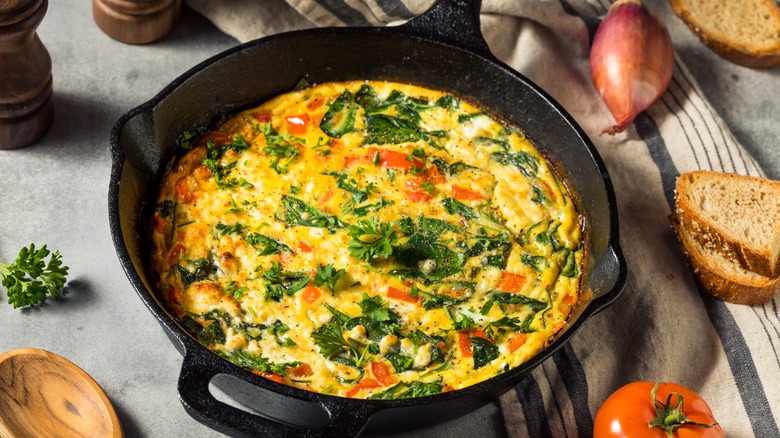Can You Eat Eggs On The Mediterranean Diet?
New diets and food fads are always cropping up, from buzzy superfoods to trendy eating plans. But sometimes, the healthiest diet tips are the tried-and-true ones rooted in history. This is the case with the Mediterranean diet.
According to Healthline, the Mediterranean diet is based on the types of foods people traditionally consumed in Mediterranean countries such as France, Spain, Greece, and Italy. Researchers have noted the exceptional health that people residing in those countries (and other countries around the Mediterranean Sea) lived with and the low risk of many lifestyle-influenced diseases they had.
Even if you can't take a time machine to old Greece or Italy, you can still reap the benefits of a Mediterranean diet today. In fact, a 2022 ranking of the healthiest diets by U.S. News & World Report placed the modern-day Mediterranean diet at number one for its overall healthiness and emphasis on practical foods like produce, fish, and olive oil.
Another staple of Mediterranean cuisine that's likely already in your refrigerator is the simple egg. Here's how to incorporate eggs into your diet the Mediterranean way.
Eggs have been in Mediterranean diets for millennia
Eggs have always been an important part of the Mediterranean diet, claims Oldways, a non-profit organization that promotes traditional food culture. The consumption of eggs in the areas surrounding the Mediterranean Sea can be traced back thousands of years. According to Egg Nutrition Center, the ancient Phoenicians who lived in the Mediterranean region 3,000 years ago kept chickens as one of their many barnyard animals. The abundance of chickens meant a consistent supply of eggs to use for everyday cooking and on special occasions for the multiple societies that have called the Mediterranean their home.
The use of eggs continued in Mediterranean cuisine from ancient times through the 1960s, and then into the modern day. And their health benefits are right on track with what the Mediterranean diet promotes, which is lowering the risk of many lifestyle diseases. It is perhaps widely known that eggs are high in protein, multiple vitamins, and good fats. They're also one of the best sources of a lesser-known nutrient called choline, according to Healthline. Choline plays an essential role in a variety of bodily functions, including regulating metabolism and synthesizing neurotransmitters. Moreover, a 2009 article published in Nutrition Reviews stated that a low intake of choline has been linked to liver disease, heart disease, and neurological disorders.
Mediterranean recipes containing eggs
If you're curious about how to incorporate eggs while following the Mediterranean diet, there are plenty of ways to keep your taste buds interested. Egg Nutrition Center points out that, traditionally, eggs were used in Mediterranean recipes to hold together other ingredients, such as vegetables, fish, nuts, and berries.
This is still seen today in popular dishes hailing from the Mediterranean region. One example you can prepare easily with just a few simple ingredients is the frittata, an Italian take on the French quiche. Tasting Table offers a no-fuss guide to preparing and customizing this egg-focused dish.
Turkey, a partly Mediterranean country, also spotlights eggs in some of its traditional dishes. Follow Mashed's Turkish eggs recipe containing Greek yogurt, or try tomatoey Turkish scrambled eggs, via Tasting Table.
Salads are another way to work eggs into a Mediterranean diet. According to Tasting Table, salade niçoise is a French dish that traditionally featured only anchovies, tomatoes, and olive oil. These days, however, it's often leveled up with potatoes, greens, and slices of hard-boiled egg.
Clearly, there are several methods for preparing eggs in a Mediterranean diet, though Mediterranean Living explains that boiled eggs are especially popular and convenient. Generally, the diet limits butter and processed oils (per eMedicineHealth), so for recipes that do call for frying or roasting, opt for extra-virgin olive oil instead.
How many eggs should you eat on a Mediterranean diet?
Eggs are a healthy addition to a Mediterranean diet, though they aren't the stars of this traditional eating plan. Instead, vegetables, fruit, seafood, lentils, whole grains, and extra-virgin olive oil tend to be most heavily emphasized (per Cleveland Clinic).
To incorporate eggs into your meals according to Mediterranean diet standards, Cleveland Clinic suggests aiming for just one egg per day and limiting egg yolks when possible. In general, no more than one yolk should be consumed each day, and for people with high cholesterol, yolks should be limited to four per week.
Similarly, Fundación Dieta Mediterránea, an organization that promotes research on the Mediterranean diet, recommends eating eggs in moderation. It notes that eggs are a complete food item, making them an ideal alternative to fish and meat. Still, the organization suggests limiting intake to only three or four servings per week.




